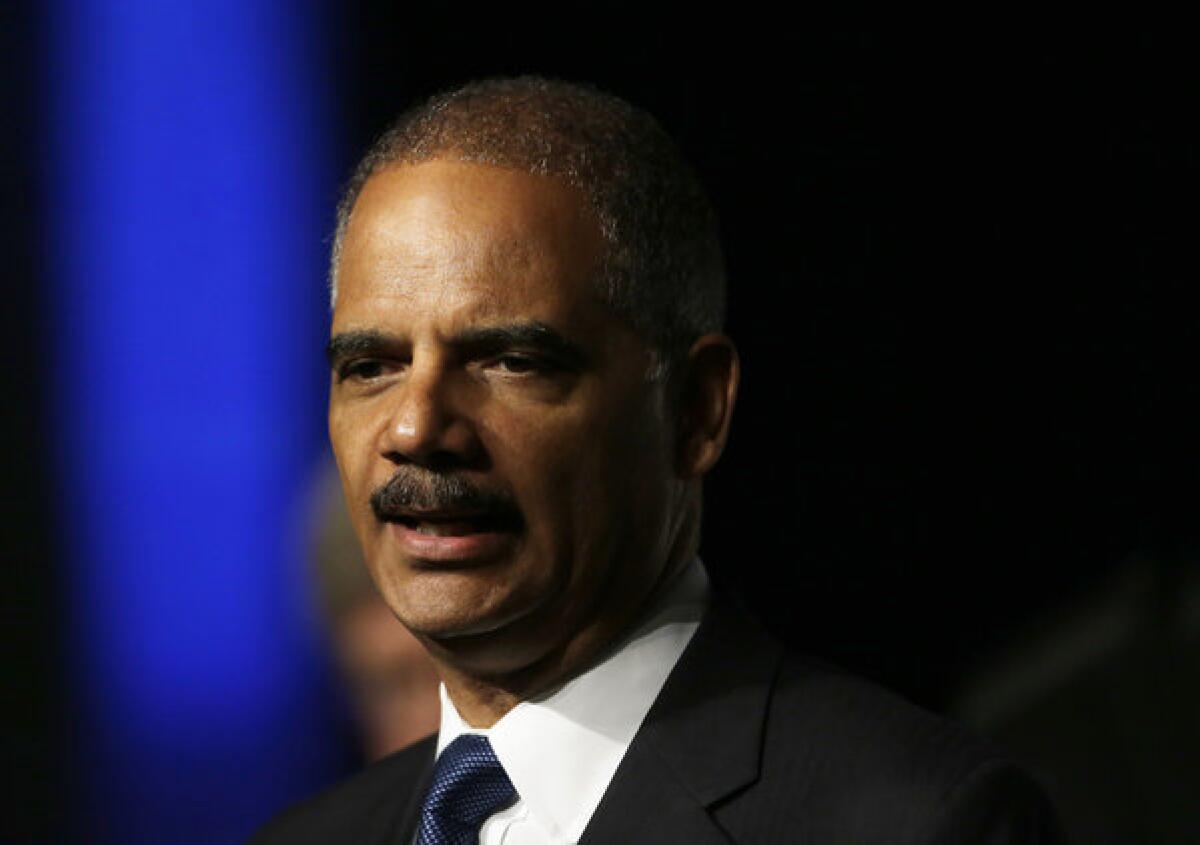Obama administration escalates fight with Texas over voting

- Share via
WASHINGTON — The Obama administration escalated its fight with Texas Republicans on Thursday over voting rights for minorities, as it urged judges to block a strict new voter-identification law that administration lawyers argue is discriminatory.
Last month, Atty. Gen. Eric H. Holder Jr. said the department would go to court to challenge the state’s drawing of legislative and congressional district boundaries, saying the plan shortchanged the political power of the state’s growing Latino population.
Prior to June 25, the Voting Rights Act required Southern states, including Texas, as well as a few non-Southern jurisdictions to persuade Washington that changes in their election laws would not harm blacks or Latinos before they could put those laws into effect.
But the Supreme Court in a 5-4 decision struck down that part of the law as outdated and no longer justified.
Now, to block a voting law, the Justice Department must persuade judges that it would discriminate against minorities if put into effect. Holder said he is determined to do just that with Texas’ voter ID law.
PHOTOS: 2013’s memorable political moments
“We will not allow the Supreme Court’s recent decision to be interpreted as open season for states to pursue measures that suppress voting rights,” he said. The department will take legal action “against jurisdictions that attempt to hinder access to the ballot box, no matter where it occurs,” he added.
The Texas law requiring a photo identification for voting ran into sharp criticism last year because of the state’s wide open spaces. Lawyers said that in some counties, registered voters who did not drive would have to go hundreds of miles round-trip to obtain an authorized photo from a motor vehicles office before they could vote.
Last year, a panel of three judges in Washington agreed that this requirement would disproportionately hurt voters who are old, poor and members of racial minorities.
The law also said a student’s official university photo did not count as acceptable identification, but a permit for a concealed handgun could be used.
Civil rights leaders praised Holder’s move. “Texas has a deeply disturbing history of brazenly suppressing the votes and voting strength of black and Latino voters,” said Sherrilyn Ifill, president of the NAACP Legal Defense Fund.
“The voter ID law in Texas is a solution in search of a problem. A Texas voter is more likely to be struck by lightening than see someone attempt to vote fraudulently at the polls.”
But Texas Atty. Gen. Greg Abbott, a Republican, slammed the Obama administration for practicing “the cynical politics of race.”
“Voter IDs have nothing to do with race, and they are free to anyone who needs one,” said Abbott, who is a leading candidate to succeed Texas Gov. Rick Perry.
“Eric Holder’s outrageous claim that voter ID is a racist plot to disenfranchise minority voters is gutter politics and is offensive to the overwhelming majority of Texans of all races who support this ballot integrity measure.”
PHOTOS: Team Obama, where are they now?
The court case could supply answers to two questions involving voting rights.
In 2008, the Supreme Court upheld an Indiana photo-ID law, but without ruling on the question of whether the law discriminated on racial grounds. The Texas case could resolve whether photo-identification laws can be challenged and blocked on the grounds that they have a racially discriminatory effect.
The case could also answer whether the Justice Department can protect voting rights by aggressively suing to block new laws from taking effect.
Earlier this year, voting-rights advocates had argued that the special “pre-clearance” rule was needed to prevent Southern states and cities from putting discriminatory laws into effect. But Justice Anthony Kennedy, who voted to strike down pre-clearance, suggested the Justice Department could step in and file lawsuits to prevent allegedly harmful laws from taking effect.
Last month, Holder said he would also seek a ruling that because Texas intentionally discriminated against minority voters, it should be required in the future to seek federal approval before changing its election laws.
All three issues — on photo IDs, redistricting and pre-clearance — will be decided by federal judges in Texas, but the losing side is likely to ask the Supreme Court for a final ruling.
Follow Politics Now on Twitter and Facebook
More to Read
Sign up for Essential California
The most important California stories and recommendations in your inbox every morning.
You may occasionally receive promotional content from the Los Angeles Times.











